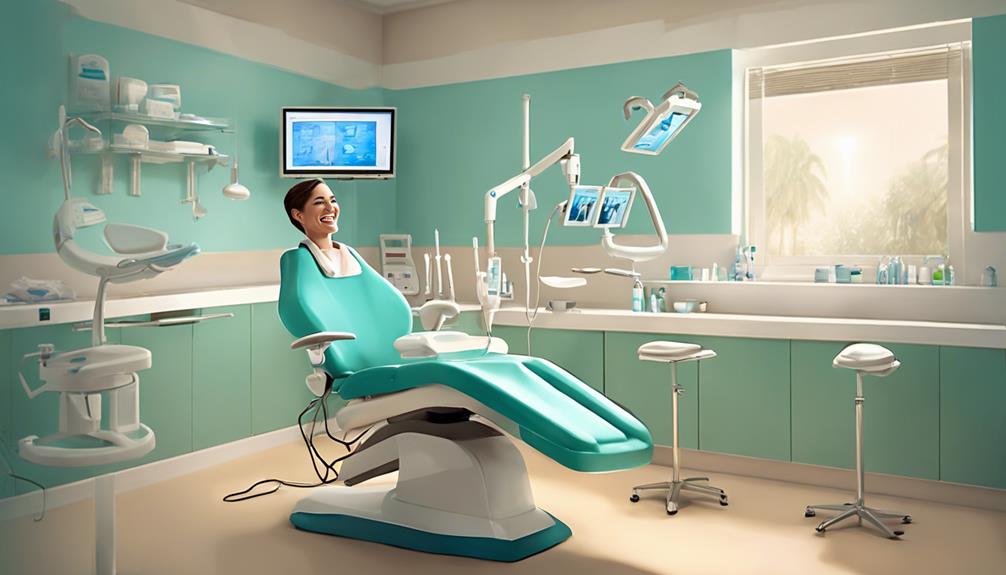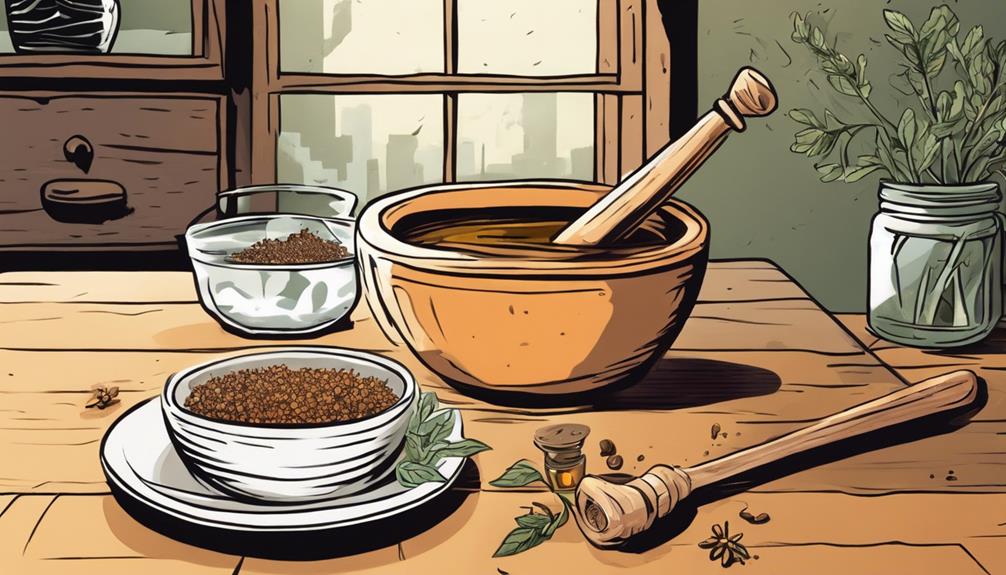If you notice bleeding gums, chronic bad breath, or tooth sensitivity, it's a sign you might be brushing your teeth all wrong. Aggressive brushing can irritate your gums, while inadequate brushing leads to bad breath and plaque buildup. Yellowing teeth signal that you're not effectively cleaning all tooth surfaces, and a white tongue indicates bacteria buildup. These issues aren't just cosmetic; they can lead to more serious dental problems. By paying attention to these signs, you can improve your oral hygiene. Stick around to explore further details on how to brush properly for a healthier smile. In addition, bad breath causes can also be linked to poor oral hygiene, as bacteria and food particles left in the mouth can lead to an unpleasant odor. Proper brushing techniques, along with flossing and using mouthwash, can help eliminate these contributing factors to bad breath. Taking care of your oral health not only improves your smile, but also contributes to your overall well-being. So, it’s important to pay attention to these warning signs and make adjustments to your oral care routine as needed.
Key Takeaways
- Bleeding gums after brushing can indicate an improper technique and potential gum disease due to plaque buildup.
- Persistent bad breath suggests inadequate brushing and flossing, allowing bacteria to thrive and produce unpleasant odors.
- Experiencing tooth sensitivity may signal aggressive brushing, leading to enamel wear and exposed tooth roots.
- Yellowing teeth often indicate ineffective brushing, as plaque accumulation and dietary factors can contribute to discoloration.
Bleeding Gums

Bleeding gums are a clear sign that your brushing technique might be damaging your oral health. When you notice bleeding, it's often an indication of gum disease caused by plaque buildup along the gumline.
If you're using improper brushing techniques, you could be irritating your gums, leading to inflammation and, ultimately, bleeding. Aggressive brushing can worsen the situation, damaging delicate gum tissue and contributing to more severe periodontal issues.
To maintain good oral hygiene, it's important to adopt proper brushing methods. Use a soft-bristled toothbrush and gentle, circular motions instead of harsh back-and-forth strokes.
If you consistently see bleeding gums after brushing or flossing, don't ignore it. This warning sign necessitates a dental consultation to address potential gum disease before it escalates, risking tooth loss and severe infections.
Chronic Bad Breath

If you notice persistent bad breath, it might be a sign that your brushing habits need improvement. Chronic halitosis often stems from inadequate brushing and flossing, allowing bacteria and plaque to build up in your mouth. When you don't brush your teeth properly, bacteria left on your teeth can multiply and release sulfur compounds, resulting in unpleasant odors.
To maintain good oral health and combat bad breath, it's essential to brush your teeth at least twice daily for two minutes. Don't forget to include your tongue and gum line, as these areas can harbor bacteria as well. Flossing is just as important, as it removes food particles and plaque stuck between your teeth that your toothbrush can't reach.
Neglecting proper oral hygiene can contribute to gum disease, which affects nearly 50% of adults in the U.S. and greatly contributes to chronic bad breath. Regular dental check-ups are crucial to address any underlying issues, such as cavities or gum disease, that might cause your persistent bad breath.
Take charge of your brushing habits now to improve your breath and overall oral health.
Tooth Sensitivity

Tooth sensitivity often signals that your brushing technique might be too aggressive, leading to enamel wear and gum irritation. If you feel discomfort when consuming hot, cold, or sweet foods, you might be experiencing gum recession caused by brushing too hard or using a hard-bristled toothbrush. This exposure of the lower parts of your teeth can heighten sensitivity, so it's vital to adopt a gentler brushing method.
| Issue | Solution |
|---|---|
| Brushing too hard | Switch to a soft-bristled toothbrush |
| Gum recession | Adjust your brushing technique |
| Tooth sensitivity | Use toothpaste for sensitive teeth |
Brushing properly with a soft-bristled toothbrush can help minimize toothbrush abrasion and protect your protective enamel. If tooth sensitivity persists, a consultation with a dental professional is important, as it may indicate underlying dental issues needing attention. By being mindful of your brushing habits, you can greatly reduce discomfort and maintain better oral health.
Yellowing Teeth

Yellowing teeth can be a frustrating sign that your brushing technique isn't effectively removing plaque and bacteria from your mouth. If you're not brushing along the gum line, plaque tends to accumulate there, leading to enamel erosion and discoloration. This buildup can cause yellowing teeth and may be a result of poor brushing habits, like not brushing for at least two minutes or less than twice a day.
Your oral health also depends on your diet. Smoking and consuming pigmented foods and drinks, such as coffee and red wine, can further contribute to yellowing teeth. To combat this, it's vital to adopt effective brushing techniques that target all surfaces of your teeth.
Regular dental cleanings are important in maintaining the brightness of your teeth and should complement your at-home care routine. Make sure you're brushing properly, focusing on those hard-to-reach areas where plaque and tartar like to hide.
White Tongue

A white tongue often signals a buildup of bacteria and dead cells, pointing to the need for better oral hygiene practices. If you notice a white coating on your tongue, it might be time to reevaluate your brushing habits.
Here are four key areas to focus on:
- Brush Your Tongue: Don't just focus on your teeth; use your toothbrush to gently clean your tongue. This helps reduce bacteria build-up.
- Stay Hydrated: A dry mouth can worsen a white tongue. Drink plenty of water to keep your mouth moist.
- Avoid Tobacco: Smoking can lead to poor oral hygiene and exacerbate the appearance of a white tongue. Quitting can improve your overall dental care.
- Consult Your Dentist: If the white patches persist, seek medical advice. They may indicate underlying health issues that need attention.
Frequently Asked Questions
How Do You Know if You're Brushing Your Teeth Wrong?
You'll know you're brushing wrong if you experience tooth sensitivity, notice gum recession, see bleeding while brushing, or find persistent plaque buildup. A worn toothbrush can also indicate you're applying too much pressure.
How Do You Know if You're Not Brushing Your Teeth Properly?
If you're feeling a bit of discomfort with hot or cold foods, or if your gums seem to bleed when you brush, it might be time to reassess your brushing habits for better oral health.
How Do You Tell if You Are Overbrushing Your Teeth?
If you're overbrushing, you might notice increased tooth sensitivity, gum recession, or bleeding gums. Check your toothbrush for wear and feel for a gritty texture on your teeth, indicating it's time to adjust your technique.
How Do I Know if I'm Brushing My Teeth Properly?
If you're trying to brush away your worries, you might be doing it all wrong! Check for sensitivity, gum bleeding, or a worn toothbrush. Brushing gently at a 45-degree angle could save your smile—no drama required!
Is Brushing Your Teeth Incorrectly a Common Reason for Dental Issues?
Yes, brushing your teeth incorrectly is a common reason for dental issues. Using the wrong technique or not brushing long enough can lead to plaque buildup and cavity formation. To prevent these issues, it’s crucial to visit the dentist regularly for professional cleanings and check-ups.
Does Brushing Your Teeth Wrongly Affect the Frequency of Dental Visits?
Are you wondering if brushing your teeth wrongly can affect the frequency of your dental visits? The visit dentist often shocking answer is yes. Improper brushing can lead to plaque buildup, cavities, and gum disease, requiring more frequent trips to the dentist. It’s important to brush correctly to maintain good oral health.
Conclusion
Just like a gardener tends to their plants, nurturing them with care, you must treat your teeth with the same attention.
Ignoring the signs—bleeding gums, bad breath, and sensitivity—can lead to a wilting smile. Embrace good habits, and your pearly whites will flourish like flowers in the sun.
Remember, every brush is a chance to cultivate a vibrant, healthy mouth. So, don't just brush; nurture your smile, and watch it bloom into a masterpiece.









